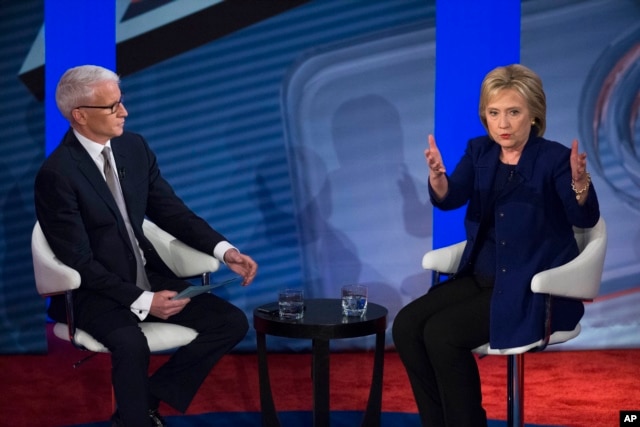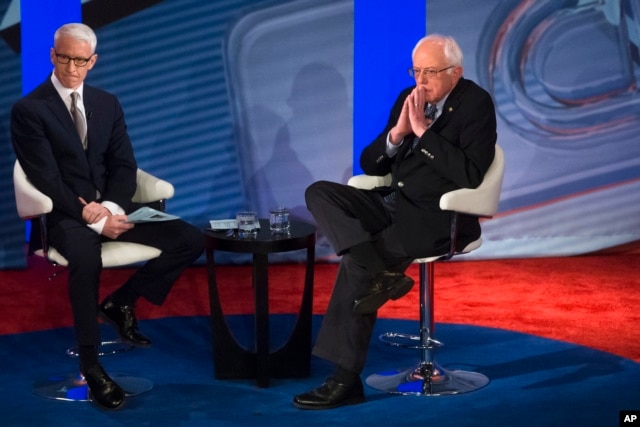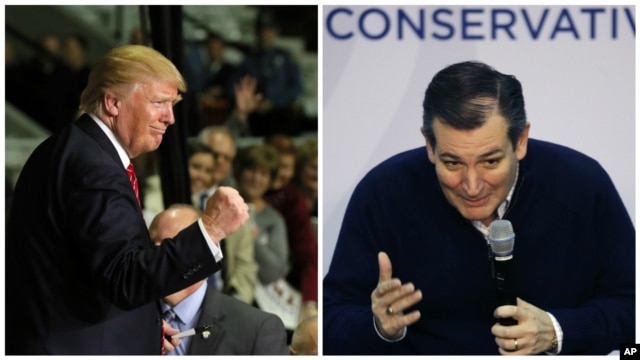
Clinton, Sanders Set for First One-on-One Debate
Last updated on: February 04, 2016 4:00 PM
Vermont Senator Bernie Sanders and former Secretary of State Hillary Clinton face off Thursday in a Democratic presidential debate in New Hampshire, just days ahead of that state’s crucial primary election.
Sanders has nearly a 16-point lead over Clinton in the northeastern state, according to an average of polls by RealClearPolitics. But Clinton is looking to reduce that gap following her razor-thin victory over Sanders in this week’s Iowa caucus.
Since the first-in-the-nation Iowa nominating contest, Sanders and Clinton have become increasingly testy as they argue over who better represents the future of the progressive movement in America.
Progressive standards
At a town hall-style event Wednesday in New Hampshire, Sanders questioned the former secretary of state’s liberal credentials over such issues as regulating Wall Street, campaign finance reform and her vote authorizing the 2003 invasion of Iraq when she was a U.S. senator representing New York state.
«I do not know any progressive who has a super PAC and takes $15 million from Wall Street,» Sanders told the audience at the CNN-hosted event, following up on a day filled with back-and-forth sparring between the two campaigns on Twitter.
Clinton said her opponent has «set himself up to be the gatekeeper on who is a progressive,» and that under his standards, neither President Barack Obama or Vice President Joe Biden fall under that category. She defended her record of fighting for such causes as health care.
The two candidates appeared separately on Wednesday’s forum. Thursday’s debate in Durham, New Hampshire will be their first one-on-one debate, after ex-Maryland Governor Martin O’Malley dropped out of the race following a disappointing third-place finish in Iowa.
Democratic presidential candidate Hillary Clinton, right, speaks alongside host Anderson Cooper during a Democratic primary town hall sponsored by CNN, in Derry, N.H., Feb. 3, 2016.
Trump attacks
On the Republican side, billionaire real estate mogul Donald Trump accused Texas Senator Ted Cruz of using underhanded tactics to win the Monday’s vote in Iowa.
Trump, who finished second in Iowa, wrote a Twitter message alleging that Cruz, a conservative firebrand, «didn’t win Iowa, he stole it. That is why all of the polls were so wrong and why he got far more votes than anticipated. Bad!»
The 69-year-old Trump, who was competing in his first election, attacked Cruz for putting out a statement, which he later retracted and apologized for, suggesting that another candidate, retired neurosurgeon Ben Carson, was leaving the race and that his supporters should instead vote for Cruz.
Trump also accused Cruz of lying about Trump’s policies and of sending some Iowa voters a mailing designed to look like an official document that accused them of a «voter violation.» The mailers gave the recipients a failing grade for not voting in past elections and said they could rectify it by voting for Cruz in Monday’s caucuses.
Trump called for either a new election in Iowa or nullifying Cruz’s win. Neither is likely to happen and Cruz’s campaign treated Trump’s broadside with amusement.
‘Reality just hit’
«Reality just hit the reality star – he lost Iowa and now nobody is talking about him, so he’s popping off on Twitter,» a Cruz spokesman said. «There are support groups for Twitter addiction. Perhaps he should find his local chapter.»
Democratic presidential candidate Senator Bernie Sanders listens to a question from the audience alongside host Anderson Cooper during a Democratic primary town hall sponsored by CNN, in Derry, N.H., Feb. 3, 2016.
Other candidates
While the small state of New Hampshire is rural, like much of Iowa, analysts say its Republican electorate is much less religious than the group of voters that helped give Cruz a 28-to-24 percent margin over Trump in Iowa.
Another conservative, Florida Senator Marco Rubio, finished a close third with 23 percent in Iowa and is looking to move higher in the New Hampshire voting. Rubio said he would seek to win over voters who supported Kentucky Senator Rand Paul, who dropped out of the race Wednesday.
Pre-election voter surveys in New Hampshire show Trump with a commanding lead over his Republican challengers, but the polling was conducted before the Iowa vote debunked any thought that Trump would sweep to the nomination with wins in state-after-state party elections.
Republican presidential candidate Donald Trump, left, pumps his fist as supporters cheer in Little Rock, Ark., while rival candidate Senator Ted Cruz speaks at a town hall campaign event in Henniker, N.H., Feb. 3, 2016.
Several Republican candidates, all calling themselves conservatives but minus some of the harsher rhetoric employed by Cruz, are looking to New Hampshire to revive their campaigns after poor showings in the farm state of Iowa.
Ohio Governor John Kasich, endorsed by The New York Times for the Republican nomination, has campaigned for weeks in New Hampshire and has pulled to second place behind Trump in some voter surveys in the state.
New Jersey Governor Chris Christie said he intends to campaign hard in the state in the coming days, and he leveled new attacks on Trump and Rubio as unqualified to be president.
Former Florida governor Jeb Bush, the son and brother of U.S. presidents, has made numerous political stops in New Hampshire and is looking to breathe new life into his well-funded, but stumbling, campaign. He is bringing his mother, former first lady Barbara Bush, now 90 years old, to New Hampshire to campaign for him.
Republicans are set to hold a debate on Saturday




